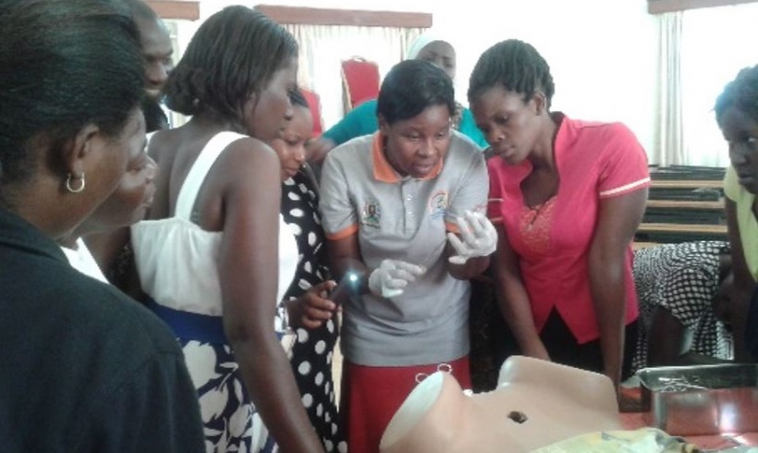Improving rights-based family planning
Lucy Asaba, winner of a FIGO Ipas Best Paper Award and presenter at FIGO World Congress 2018, discusses the importance of investing in rights-based, multidimensional approaches to contraception in Uganda.

Pictured: Health worker counselling. Photo by Grace Ojirot
Family planning (FP) services promote the right of an individual or couple to choose their number of children. However, many barriers can keep people from realising this right.
In Uganda, broadening the contraceptive method mix remains challenging. The national contraceptive prevalence rate (CPR) is 35%, with 25% using short-acting methods, especially injectables (21%).
What are the barriers that prevent people from using FP or selecting additional methods? Clients may not make their ideal contraceptive decisions because of unsupportive partners, relatives and community; a limited choice of contraceptives; or limited provider skills.
In Uganda, Ministry of Health (MOH) training often focuses on short-acting methods like pills, injectables, or condoms. During an assessment by our Fistula Care Plus project, one health worker said:
“When I am talking to clients about methods, I don’t talk about IUD in case one asks for it and yet I cannot insert it”.
Our project conducted health education activities to create awareness and demand for less-used methods, provided equipment to facilities, and adapted distribution approaches to avoid contraceptive stock-outs. We supported the MOH to revise the basic FP training manual to include short- and long-acting methods and rights-based, client-centered counselling.
The project also gave health workers classroom and practical training in counselling and clinical skills for method provision, infection prevention, and integration of FP with other services. One trainee told us:
“I didn’t know that if you miss a pill in a row, you take one as soon you remember, then the one meant for that day at the usual time. I used to think that if you miss one pill you throw away the packet and start on another”.
Another reported, excitedly, “I did not imagine that I could insert an implant on a client but I did it!” Feedback like this showed us how much providers appreciated more knowledge and how their confidence grew with their skills.
We followed up with trainees at facilities, to strengthen counselling and care practices. One told us:
“When you assure a client of privacy and confidentiality, a client opens and narrates her sexual issues and relationships without fear!”
Another reported, “We have been missing a lot by not being client centered.” After these efforts, we saw improved provider-client interactions. Referring to her conversation about sexual relationships with the provider, a client said, “Ha! Again I have talked too much, but it is okay – I want you to understand me!”
This experience showed us the impact that client-oriented capacity building can have. We must invest in programs to ensure that FP services are rights-based, providing good counselling and real method choice.
I hope that seeing the positive results of our experience in Uganda inspires others to commit to expanding rights-based FP programming.
Find out more about the programme for FIGO World Congress and register at figo2018.org.